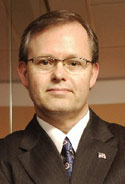 Last week, Public Company Accounting Oversight Board member Charles D. Niemeier spoke at The Atlantic’s “Ideas Tour,” which has been billed as a convention of “great thinkers and prominent members of the public for live dialogue, debate, and discussion around the celebration of ideas.” Niemeier spoke on “American Competitiveness in International Capital Markets.”
Last week, Public Company Accounting Oversight Board member Charles D. Niemeier spoke at The Atlantic’s “Ideas Tour,” which has been billed as a convention of “great thinkers and prominent members of the public for live dialogue, debate, and discussion around the celebration of ideas.” Niemeier spoke on “American Competitiveness in International Capital Markets.”Niemeier’s remarks come just as the PCAOB is in the middle of a complete revision of Audit Standard 2 (which, rumor has it, will be renamed Audit Standard 5). AS2 is the PCAOB’s rule that specifies how independent audit firms should audit a public company’s internal controls as part of the dreaded Section 404 of the Sarbanes-Oxley Act. Its detailed specifications have permitted audit firms (who were burned so badly following Enron that one of their largest, Arthur Andersen, collapsed) to force issuers to pay large sums to ensure that their internal controls are strong enough that another Enron or Worldcom doesn’t happen again. However, critics accuse AS2 of focusing on such picayune matters that the costs involved do not justify the additional safety to investors. (In reality, when companies complain about Sarbanes-Oxley, they mean Section 404. The costs created by the rest of the act are minor.)
Niemeier’s speech offers a defense of high U.S. regulatory standards and against the charge that the Sarbanes-Oxley Act is driving foreign issuers away from the U.S. market. In doing this, he makes several interesting points:
- Individual investors enhacne the competitiveness of companies listed in the United States by offering low-cost, long-run funding at a level unparalleled in any other country. These investors are able to do this because of the degree of investor protection found in the U.S. market. Niemeier cites data showing that the cost of capital for foreign firms cross-listed on their home markets and in the U.S. is significantly lower (from 7 percent lower for Japanese companies, to 25 percent lower for Egyptian firms).
- Not every company wants to pay the price that comes with this low-cost capital. In particular, companies with powerful insider may not wish to list in the U.S. becuase their abilities to extract private benefits from the companies they control are limited in the United States because of U.S. laws protecting minority shareholders.
- Over time, as more and more foreign markets adopt stronger securities regulations and shareholder protection laws, these markets also become attractive places to invest. U.S. markets now face more competition because of this.
- The decline in the U.S. share of world IPOs long predates Sarbanes-Oxley and is likely related to other polistical and economic factors. Niemeier cites data showing that the U.S. portion of world IPOs has been decreasing since 1996, and has actually recently seen a 15 percent uptick. Part of this is due to low interest rates around the world, which has made private equity and leveraged finance firms more attractive vis-a-vis equity issuances. In addition (and as I have noted here), a large number of recent IPOs by privatized state-owned enterprises (particularly in France and China) has boosted foreign markets, notwithstanding the significant valuation premium the IPOs might have gotten had they listed in New York. (SEC Chairman Cox made a similar observation in a speech he made in China just prior to the China Construction Bank IPO in Hong Kong.)
- Niemeier notes that the number of U.S. companies having IPOs has dropped dramatically since the collapse of the dot.com bubble. He also takes a swipe at the UK, noting that the London Stock Exchange's Alternative Investment Market (AIM), which advertizes itself as a low-regulation market for new companies, is really looked at more as an alternative to private financing than having an IPO on the U.S. market.
- Niemeier also states that he expects changes to SEC and PCAOB rules to help address the costs associated with Section 404.
No comments:
Post a Comment